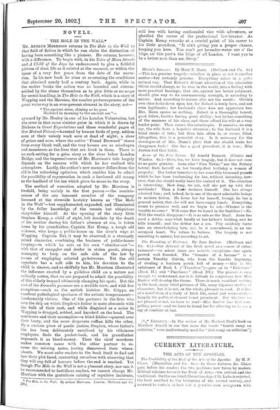- THE HOLE IN THE WALLS
MR. ARTHUR MORRISON returns in The Hole in the Wall to that field of fiction in which he can claim the distinction of having been something like a pioneer. He returns, however, with a difference. To begin with, in his Tales of Mean Streets and A Child of the Togo he endeavoured to give a faithful picture of slum life as it existed at the moment, or within the space of a very few years from the date of the narra- tion. In his new book he aims at re-creating the conditions that obtained nearly half a century back. Again, while in the earlier books the action was so bounded and circum- scribed by the slums themselves as to give little or no scope for scenic handling, in The Hole in the Wall, which is a story of Wapping and the Marshes, the sombre picturesqueness of the great waterway is an ever-present element in the story, not—
"The ancient river, shining as he goes
Mailclad in morning to the ancient sea"— nymned by Mr. Henley in one of his London Voluntaries, but the river in that same sinister guise in which it is drawn by Dickens in Great Expectations and those wonderful pages of Our Mutual Friend.,—haunted by human birds of prey, seldom seen at their unholy work save at dead of night; a river of grime and ooze, where the notice "Found Drowned" stares from every blank wall, and the very houses are as misshapen and monstrous as the lives that are lived in them. There is no such setting for a grim story as the river below London Bridge, and the impressiveness of Mr. Morrison's tale largely depends on the success with which he has realised this atmosphere. Lastly, the author's new manner differs from the old in the refreshing optimism which enables him to admit the possibility of regeneration in such a hardened old scamp as the landlord of the inn which gives its name to the story.
The method of narration adopted by Mr. Morrison is twofold, being mainly in the first person — the reminis- cences of the one innocent member of the company focussed at the riverside hostelry known as • The Hole in the Wall '—but supplemented, expanded, and illuminated by the fuller knowledge of the unseen but ubiquitous story-teller himself. At the opening of the story little Stephen Kemp, a child of eight, left desolate by the death of his mother during his father's absence at sea, is taken home by his grandfather, Captain Nat Kemp, a tough old widower, who keeps a public-house on the river's edge at Wapping. Captain Nat, it may be observed, is a strangely mixed character, combining the business of public-house keeping—in which he acts as his own " chucker-out "— with•that of smuggler and dealer in stolen goods, always managing to keep on the safe side of the law by means of employing salaried go-betweens. Yet the old reprobate has a soft side to him, his devotion to the child is sincere, and so skilfully has Mr. Morrison illustrated the influence exerted by a guileless child on a nature not radically rotten, that we are prepared to admit the possibility of this elderly leopard ultimately changing his spots. But the rest of the dramatis personae are a terrible crew, and with few exceptions—such as the sottish histrion Mr. Cripps, an excellent pathological specimen of the artistic temperament— irredeemably vicious. One of the partners in the firm who own the ship on which Stephen's father is mate absconds with the bulk of their cash, and while disguised as a sailor in Wapping is drugged, robbed, and knocked on the head. The murderers and their accomplice—a blind fiddler—quarrel over their booty, and the more desperate ruffian kills the other. By a curious piece of poetic justice, Stephen, whose father's life has been deliberately sacrificed by his villainous employers, finds the pocket-book, and his grandfather impounds it as blood-money. Then the chief murderer makes common cause with the other partner to re- cover the missing notes, having discovered their where- abouts. We must refer readers to the book itself to find out how their plot fared, contenting ourselves with observing that they will sup full of horrors before the end is reached. Yet though The Hole in the Wall is not a pleasant story, nor can it be recommended to fastidious readers, we cannot charge Mr. Morrison with the gratuitous coining of repulsive incidents, • 718 Hole in the W.U. By Arthur Morrison. London: Methuen and Co. still less with having confounded vice with adventure, or glorified the career of the professional law-breaker. As Captain Kemp remarks at a crucial point of his career to his little grandson, " It ain't giving you a proper chance, keeping you here. You can't get lavender-water out o' the bilge, an' this part's the bilge of all London. I want you to be a better man than me, Stevy.-






































 Previous page
Previous page